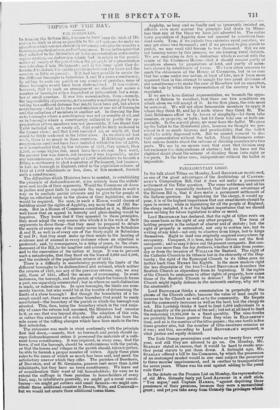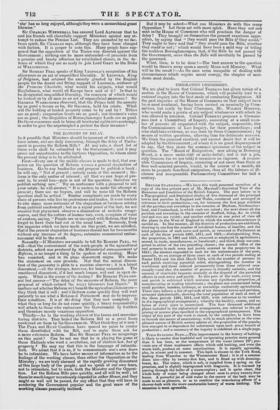PARLIAMENTARY LOGIC.
IN the talk about Tithes on Monday, Lord BROUGHAM mentioned, as one of the great advantages cf the Archbishop of CANTER- BURY'S Composition Bill, that it does not make a permanent settlement of the Tithe question. The same nobleman and all his colleagues have repeatedly declared, that the great advantage of the Reform Bill is, that it does make_ a permanent settlement of the Reform question. In legislating for the clergy, it would ap pear, it is of the highest importance that our enactments should be open to review • while in legislating for all the people of England, the clergy included, it is of the highest importance that we should leave nothing for future legislation to alter or mend.
Lord.BRouGHAm has declared, that the right of tithes rests on the same basis as the right of any other property. The form of holding property is the subject of charter and of statute ; but the right of property is antecedent, not only to written law, but to writing of any kind—not only to charters from kings, but to kings themselves. Right to land was originally acquired everywhereby occupancy. Conquest, it is true, may have driven out the first occupants ; and so may it drive out the present occupants. But con- quest is no more than the lex fortioris, whether it date from yester- day or from the invasion of WILLIAM the Bastard. The right of the Catholic Church to its tithes is lost in the obscurity of the Hep- tarchy ; the right of the Episcopal Church to its tithes goes no farther back than HENRY the Eighth. Is the more modern right the less disputable of the two ?—Lord BROUGHAM describes the Scottish Church as stipendiary from its beginning. If the rights of the Church be analogous to other rights of property, how came those of the Scottish Church to defease ? If the rights of the Church might legally defease in the sixteenth century, why not in the nineteenth ?
Lord BROUGHAM thinks a commutation in perpetuity of the. claims of the Church unfair, because the value of land ought to increase to the Church as well as to the community. He forgets that the community increases as well as the land, but• the clergy do not. His Lordship thinks it hard to limit 5,000 individuals to a fixed quantity of the produce of the soil ; but not at all hard to limit the remaining 19,995,000 to a fixed quantity. The nine-tenths are probably five times greater than they were in ELIZABETH'S time, and so is the number of the tithe-payers ; the one-tenth is five times greater also, but the number of tithe-receivers remains as it was ; and this, according to Lord BROUGHAM'S argument, is what justice and equity demand.
The Irish Orange processions cost twelve or twenty lives every year, and still they are allowed to go on. On Monday, Mr. STANLEY stated in excuse, that it would be hard to create ano- ther penal statute to put. them down. A fortnight ago, Mr. STANLEY offered a bill to the Commons, by which the possession of an unstamped musket would in one case subject the possessor to three months' imprisonment, and in another to transportation for seven years. Where was his zeal against adding to the penal code then?
In the debate on the Pension List on Monday, the representative of old Mrs. Grimsby fairly put Lord ALTHORP in a cleft stick. "You argue," said Captain HARRIS, "against depriving these pensioners of their pensions,. because they were a monarchical, grant ; and yet you take away from Grimsby. the privileges which
slip' has so long enjoyed, although they were a monarchical grant likewise."
Sir CHARLES WETHERELL has assured Lord ALTHORP that he and his friends will cheerfully support Ministers against any at- tempt to reduce the Pension List. They are animated by no fac- tious spirit, Sir CHARLES says, although they have been charged with faction. It is proper to note this. Many people have sup- posed that the opposition of the Tories was directed against the Goverinnent ; nothing can be more unfounded—it proceeds from a genuine and hearty affection for established abuses, in the de- fence of which they are as ready to join Lord GREY as the Duke Of WELLINGTON.
Sir ROBERT PEEL speaks of King LEOPOLD'S resignation of his allowance as an act of unqualified liberality. If LEOPOLD, King of Belgium, had retained the annuity granted by the English people for the decent and fitting support of LEOPOLD, widower of the" Princess Charlotte, what would his subjects, what would Englishmen, what would all Europe have said of it? Is that to be slesignated.unqualified liberality, the converse of which would be looked on by all men as an act of unparalleled meanness ? Sir GEORGE WARRENDER observed, that the Prince held the annuity by as good a tenure as he, Sir GEORGE, held his estate. What will the holding of landed property come to by and by ? Tithes are as good ; corporation trusts are as good ; out-freemen's votes are as good ; the illegalities of' Boroug,hinong,er Lords are as good. Do these reasoners seek to bring all territorial rights into contempt, in order to give the unprincipled a pretext for their invasion ?



























 Previous page
Previous page